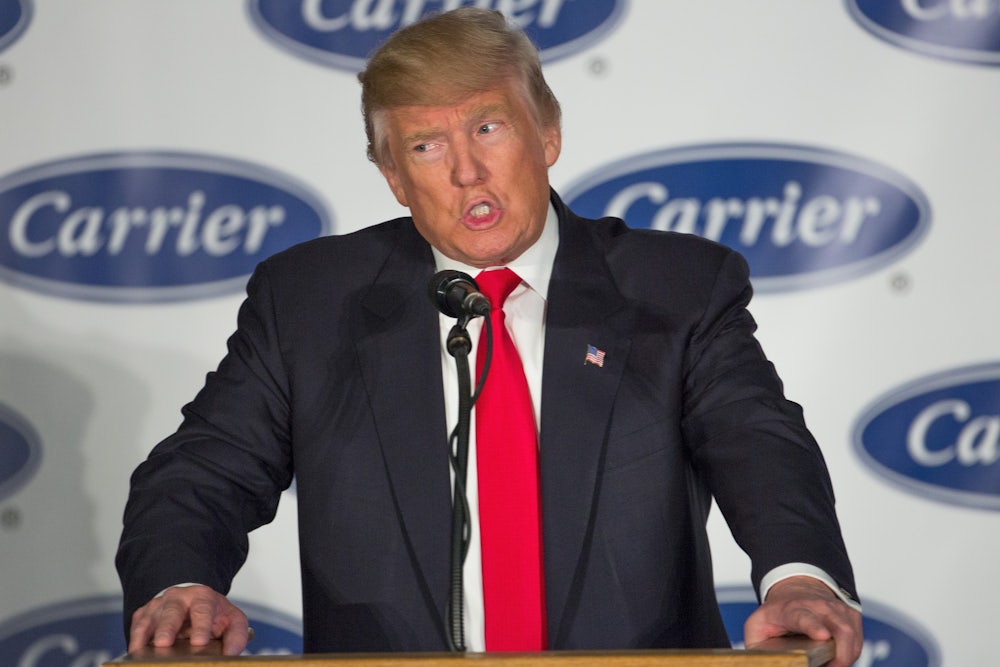In his inaugural address, President Donald Trump promised he would create 25 million new jobs over the next ten years, more than any American president before him. As proof that he’s living up to that pledge, he has taken every opportunity to crow about various companies’ plans to invest in the country.
He had two opportunities recently to brag about the art of his deal-making. First, Wisconsin boasted that Foxconn, a Taiwanese tech supplier, would build a massive plant in the state in exchange for a record-setting tax incentive package. Then Toyota and Mazda announced that they will soon team up to build a $1.6 billion plant in the country—exact destination to be determined.
“A great investment in American manufacturing!” Trump tweeted after the Toyota and Mazda news, following up with a reminder of the Foxconn deal. Behind the scenes, his team took credit for the president’s business prowess.
Toyota & Mazda to build a new $1.6B plant here in the U.S.A. and create 4K new American jobs. A great investment in American manufacturing!
— Donald J. Trump (@realDonaldTrump) August 4, 2017
....and don't forget that Foxconn will be spending up to 10 billion dollars on a top of the line plant/plants in Wisconsin.
— Donald J. Trump (@realDonaldTrump) August 4, 2017
Similarly, Trump, to great fanfare, took credit for Carrier’s decision not to relocate hundreds of jobs to Mexico back in December, a feat pulled off with $7 million in tax benefits from the state of Indiana.
But in reality, no one wins under these kinds of deals except the companies themselves. The Foxconn and Toyota-Mazda agreements represent the latest escalation in a growing arms race between states to devise wildly lucrative incentives to lure companies and their jobs. These deals don’t actually have much of an impact, however, despite their big price tags. The jobs Trump can most reasonably take credit for represent the worst kind of deal-making.
It’s already a risky bet, since Foxconn does not have a great track record in following through on its promises. In 2013, the company said it would invest $300 million in Pennsylvania and create 500 jobs. But it never came to fruition: No factory was built and no one was hired. It has also promised a $5 billion investment to India that has yet to move forward and $10 billion to Indonesia even though no plant has been built.
If Foxconn’s Wisconsin factory actually does create 13,000 jobs, the upper limit of what the company estimated, that would mean the state is spending $230,769 per job that will pay an average annual salary of $53,000. But so far the company has only actually committed to 3,000 jobs—which would mean Wisconsin shelling out a whopping $1 million per job.
That is far out of range of what is typical for these state incentive deals. On average, states offer more like $2,500 per job.
But Foxconn isn’t done. Now it’s shopping around to find a nice package from another state for other facilities.
Toyota and Mazda will be suitors’ next target. Its new partnership was a blatant invitation for bids from state governments. The announcement was made without any details on the location of the new plant; instead, as Toyota North America chief Jim Lentz told Reuters, “All of it boils down to an economic arrangement.” We can expect to see states rushing to throw money at the companies for the honor.
If they were smart, though, states would keep their money to themselves. Even deals with smaller dollar amounts than Wisconsin’s are questionable. Incentive packages have tripled in size since 1990, as states feel increasing pressure to up the ante to attract jobs for their residents. Yet research has found that these packages rarely change companies’ behavior. One study found that companies receiving tax incentives wouldn’t have left the states that offered them anyway. On top of that, the tax breaks had no discernable impact on job creation or company expansion.
An examination of a Texas program that offers companies tax abatements in exchange for economic investment found that, despite the state spending an estimated $7 billion, including $4 billion subtracted from local schools, between 85 and 90 percent of the projects would have located there even without such enticement. It didn’t even attract new investment from abroad; most foreign applicants weren’t considering locating in any other country anyway.
Meanwhile, these packages don’t correlate with better economic performance. State tax regimes don’t have a substantial impact on economic activity. Rather, they represent a hefty giveaway from a state’s taxpayers to a large corporate entity.
But despite their poor track record, they are beloved by politicians, who can point to the packages as proof that they are doing something concrete to create jobs for their constituents—whether it pans out that way or not. Trump is using a well-worn playbook when he talks these deals up on Twitter.
That’s exactly the playbook he relied on with Carrier. Trump flew to Indiana for a photo-op tour of the plant at the end of last year, before he was inaugurated, to showcase the deal he supposedly struck to save American jobs. While Trump said he promised the company that he would lower the corporate tax rate and undo business regulations, the real sweetener was likely the millions of dollars Indiana residents will hand over to the company. Even with the $7 million price tag, only about 1,000 jobs were preserved; the company started moving another 600 to Mexico last month.
Unfortunately for Trump, these terrible deals are the only ones he can really lay any claim to. Although he’s tried to take credit for numerous other job-creating announcements companies have made since he entered the White House, most of them stem from plans that were announced long before he even ran for president. So now he has to hang his hat on expensive, useless state tax deals.
